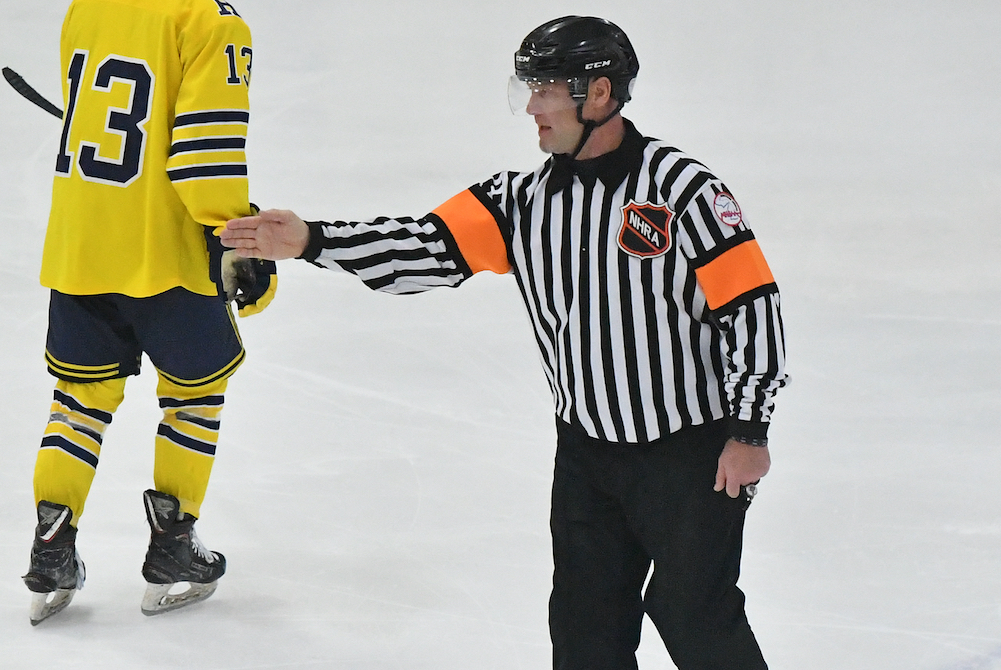
Retired NHL-er Back on Ice to Answer Call - By Making Them
By
Rob Kaminski
MHSAA benchmarks editor
March 16, 2023
The most accomplished skater on the ice during Friday’s triple-overtime MHSAA Division 1 Semifinal hockey thriller between Hartland and Brighton was not wearing the school colors of either team.
In front of a packed house at Plymouth’s USA Hockey Arena, referee Bryan Smolinski was in stripes, just like the rest of his officiating crew.
In his former life, he pulled on plenty of sweaters before lacing up the skates. That happens when one logs more than 1,000 games, tallies nearly 300 goals (274) and close to 400 assists (377) with eight teams spanning a 15-year playing career in the National Hockey League.
So, how did the 52-year-old former star player find himself on the ice last weekend as one of the referees for the pinnacle weekend of this high school season? Good question, even for the man known as “Smoke” during his playing days.
“I was working in youth development programs a few years back and reached out to some Michigan guys I had connections with about other ways to help the game,” Smolinski said. “I called Kevin May just to chat and asked, ‘Hey, how’s your reffing going?’ He said, ‘You know, we’re down a little bit,’ then said, ‘Why don’t you do it?’ I said, ‘Not a chance,’” Smolinski laughed.
Never Say Never
May persisted, imploring his friend to skate with him during a Fall league at Cranbrook in Bloomfield Hills. After eight weeks, once a week, Smolinski had a revelation.
“I’m like, ‘I’m kind of diggin’ this,’” Smolinski said “So, I did all the testing, and the educational part of it, and I really enjoyed it. I got with Danny (DiCristofaro) and his group, and he put me in as much as he could, and I really started to get my feet wet.”
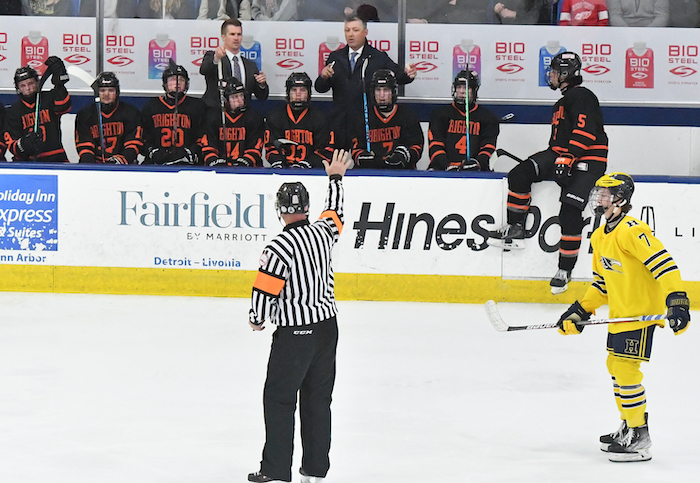 DiCristofaro is the assigner and referee-in-chief for the MHSAA’s Northeast Hockey Referees Association, and he has seen Smolinski’s growth first-hand.
DiCristofaro is the assigner and referee-in-chief for the MHSAA’s Northeast Hockey Referees Association, and he has seen Smolinski’s growth first-hand.
“Obviously he’s got great instincts and a feel for the game, along with a wealth of experience, all of which has allowed him to climb the ladder quickly,” said DiCristofaro. “It’s been a joy to watch his growth as an official.”
Fast forward to last Friday, and there were Smolinski and May sharing duties as referees during the MHSAA Semifinal with linesmen Michael Andrews and Thomas Robbins.
In between, there has been a learning curve that still continues, but the jump to officiating was not quite as daunting as his introduction to the NHL.
“I was scared to death. My first game was against Mario Lemieux. I’m in the old Boston Garden and now I’m playing against these guys and it’s their job, and they’re out there trying to make a living,” Smolinski recalled.
The emotions were not running nearly as frenzied for his first game as an MHSAA official, obviously, yet respect came in a different form.
“I couldn’t pick the puck up, I was breathing heavily; it was Kevin and me doing a two-man game in Brighton,” Smolinski recalled. “There were a few high-end kids playing, and I’m thinking, ‘I’m dying here.’ You know, there’s no training for that first time.”
What that experience did, however, was revitalize Smolinski in a new way. His playing career is well documented, not only in the NHL, but around Michigan. He enjoyed an honor-laden career at Michigan State University from 1989-93 before joining the Boston Bruins (who had drafted him three years earlier) at the end of the ’93 NHL campaign. Even after his final season, with Montreal in 2007-08, he stayed in the game via men’s leagues, or coaching his son, Max.
Smolinski and his wife, Julie, have three daughters: Ashtyn (22), Jojo (16) and Rylen (12), along with Max, whom dad coached for seven years including during a national championship run with a Little Caesars U15 team in 2019. Max, 19, is now playing collegiately at Rensselaer Polytechnic Institute.
So, for Smolinski, officiating offers a new chapter.
“Reffing brought back ... I wouldn’t say love of the game, because that’s always been there; it’s a different side of enjoying the game now. I have no horse in the race, my son’s off to college, my daughters are doing their thing; I wanted to find something new in the game,” Smolinski said. “I’ve coached, and I don’t want to do that. I found this, and I’ve stuck with it.”
Old College Ties
One of the great benefits of athletics at any level are the friendships made. For two kids who met in their first years on the MSU campus and forged a bond that lasts to this day, it’s amazing how their careers reached the pinnacle and have now come full circle.
Wes McCauley, an MSU teammate, is one of Smolinski’s best friends. After numerous years in the minor leagues, McCauley, like his friend, made it to the NHL. But McCauley made it as an official, working his first NHL game in 2003, when Smolinski was nearing the end of his playing career.
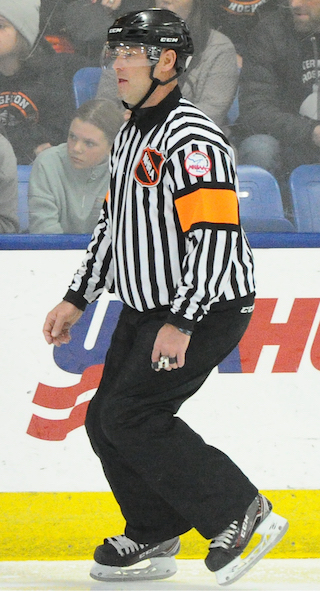 Their games lined up on just a few occasions in the NHL, and the two lobbied hard to have McCauley work Smolinski’s 1,000th career game in his final season with the Canadiens in 2007-08. The request, sadly, was denied by the league.
Their games lined up on just a few occasions in the NHL, and the two lobbied hard to have McCauley work Smolinski’s 1,000th career game in his final season with the Canadiens in 2007-08. The request, sadly, was denied by the league.
On the rare occasions when the friends did share the same ice, less than a handful by Smolinski’s count, it was McCauley who was forced to rebuff any attempts at fraternization. It’s just part of an official’s edict.
“For both of us, it was amazing; it was just great,” Smolinski said. “I’d say, ‘Hey man what’s up?’ and he says, ‘Can’t talk.’ I’m like, ‘What do you mean, we talk all the time.’ Again, he’s like, ‘Can’t talk, get away from me.’ You know, it was just business.”
McCauley then reached the 1,000-game plateau himself in 2018 and is still going strong as a regular selection for playoff duties with nine Stanley Cup Finals assignments, including last year.
So, it should have been natural for Smolinski to go to his old friend immediately for officiating pointers once he joined the ranks, right? Well, maybe not immediately.
“I talk to Wes all the time, but I actually hid it from him right out of the gate because I didn’t want to take his razzing. Eventually it got out, and he was loving it. He started sending me whistles and visors and pants,” Smolinski said, grinning. “And none of it fit, you know, because I’m older and fatter, and he’s so damn skinny. So, I still had to go out and get all new gear.”
Both Sides Now
Having been to the top of his profession, now moving to the other side of that same mountain that his friend McCauley scaled, the respect has grown for those blowing the whistle.
“The preparation for officiating is much more mental,” Smolinski said. “Way more rules oriented. You’re always trying to get away with things that you can as a player; now you have to police that.”
Smolinski has a distinct advantage.
“I know everything they’re trying to do because I’ve done it. I know where you’re going with the puck, I know what kind of breakout you’re trying to do,” Smolinski said. “I have all the instincts, now I just try to stay out of the way and not ruin their game. The most fun is watching the game develop and the ups and downs. For me to be out there and enjoy it with them, that’s the fun part.”
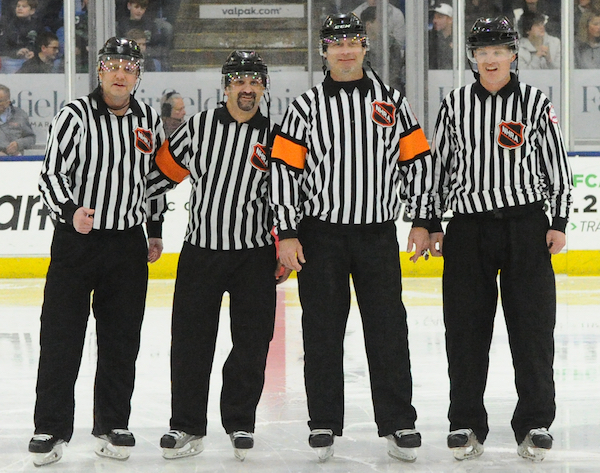 Those who have played hockey at any level have a built-in advantage should they consider the officiating avocation: the ability to skate. Unlike officiating in any other sport, skating is a prerequisite. This makes the pool limited, and almost solely composed of former players. Smolinski offers this advice.
Those who have played hockey at any level have a built-in advantage should they consider the officiating avocation: the ability to skate. Unlike officiating in any other sport, skating is a prerequisite. This makes the pool limited, and almost solely composed of former players. Smolinski offers this advice.
“I prefer sticking with high school because I think there’s more decorum, more administrative structure. Kids are playing for their schools, there’s loyalty there,” said Smolinski. “And there is more accountability. People need report to athletic directors and supervisors. Other levels can be more loosely governed, or a bit more maverick in nature. Moms and dads get involved more, coaches maybe know a little less,” said Smolinski.
He has, in fact, worked a handful of non-school games, and there’s a stark difference.
“I wanted to see what was going on, and I see it first-hand,” Smolinski said. “There are some crazy people and parents out there, and these guys are getting absolutely tortured. I’ve been tortured. There has to be a level of respect for what officials do. I think schools can rein that in a little more. All the guys I’ve met give up a lot of time and work hard because they love to do it and love the game.”
All sports need an assist from school administration and from those who once played the games to keep the officials recruitment moving in the right direction. People like Smolinski can help.
“He clearly doesn’t need to do this, and that’s what makes it so fantastic,” DiCristofaro said. “We need more people who have played – at any level – to do what he’s done and stay in the game as officials.”
Smolinski continues to promote the game in other ways as well. Currently, he is involved in the NHL’s Learn To Play initiative, which aims to inspire youth and welcome more families into the hockey community.
“We work hand-in-hand with the NHL Players Association for player development and industry growth,” Smolinski said. “Ages 5 to 9 are introduced to hockey, get head-to-toe gear and instruction, and meet some former players.”
The idea is to have fun first, which can translate into years and maybe even a lifetime in the sport. It’s a lifetime that has given Smolinski so much and continues to do so as he watches it unfold for others from his new vantage point.
PHOTOS (Top) MHSAA official Bryan Smolinski signals during Friday's Division 1 Semifinal between Brighton and Hartland. (2) Smolinski, a retired NHL standout, communicates with the Bulldogs' bench. (3) Smolinski keeps watch during game play. (4) Smolinski, third from left, with his crew: Michael Andrews, Kevin May and Thomas Robbins.
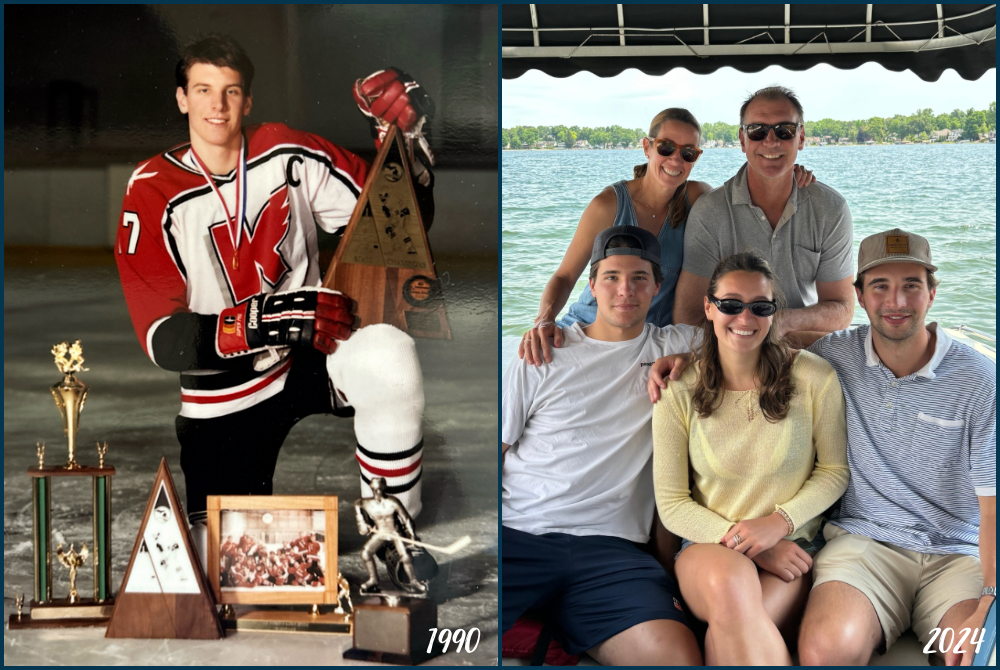
East Kentwood Run Part of Memorable Start on Knuble's Way to NHL, Olympics
By
Dean Holzwarth
Special for MHSAA.com
July 24, 2024
KENTWOOD – It’s been more than 30 years since the 1990 Class A championship hockey game was played in Flint.
 However, Mike Knuble still recalls vividly a key moment that helped East Kentwood upset favored Trenton.
However, Mike Knuble still recalls vividly a key moment that helped East Kentwood upset favored Trenton.
“One of our players scored on a fluky bounce with about seven or eight minutes left,” said Knuble, who recorded a hat trick in the 5-4 victory. “(Trenton) threw everything at us after that, and somehow we held them off and they weren’t able to score. Our goalie had a heck of a game, and it happened to be our night.”
The state title was the program’s first. It also marked the final game of a remarkable high school career for Knuble, who would eventually go on to have a lengthy career in the NHL.
The Falcons had lost in the 1989 Semifinals to Flint Powers Catholic, which helped fuel their run to the championship game the following season.
“We felt we should be there as a team,” said the 52-year-old Knuble, who tallied an eye-popping 103 points (63 goals/40 assists) his senior year.
“We got by Flint Powers, and the question was if we could win the final game. Trenton had a nice program for a number of years, and a lot of history. We wanted to keep it close and then hang on.”
The emergence of the East Kentwood hockey program, guided by legendary coach Ron Baum, was a community initiative.
“We had a real grassroots effort in the 80s to get a youth program started, and that filtered to the high school,” said Knuble. “We built the rink by hand, and I remember hauling hoses into the building for the sand flooring. It was a unique time in Kentwood with the amount of focus on the program and buy-in from the community.
“It was a real nice high school to play for in the late 80s and early 90s, and we always had competitive teams and nice players. We played a lot of hockey when we were younger.”
In 1991, Knuble was drafted by the Detroit Red Wings in the fourth round, 76th overall, and played the next four seasons at University of Michigan.
He earned Central Collegiate Hockey Association second-team honors twice and was named an NCAA West All-American in 1995.
“I was pretty raw so I had to develop my skills as a player, and someone in the Red Wings organization identified some potential in me,” Knuble said. “It’s one thing to be drafted and another thing to sign a pro contract, so the good thing was Michigan gave me a longer runway to develop as a player on and off the ice. It gave me extra time to get my game in order in the right environment under a great coach.”
Knuble made his NHL debut on March 26,1997, against the Colorado Avalanche. He played nine games, but not during the playoffs as the Red Wings went on to win their first Stanley Cup championship since 1955.
Knuble made the roster the following year and was a part of Detroit’s 1998 team that won the Stanley Cup for the second straight season.
“I didn't have a huge hand in it; the players that were there really drove that bus, and we were younger guys,” Knuble said. “We had a lot of fun and enjoyed ourselves, but at the end of the day you know who really won things and it was a great experience as a young player.
“You learn what it takes to be a pro, you watch how guys operate and how a winning team works. Everyone accepted their roles.”
Knuble, who resides in the Grand Rapids area, would ultimately play 16 seasons in the NHL with Detroit, the New York Rangers, Boston Bruins and Philadelphia Flyers.
He played in 1,068 games and scored 278 goals along with 270 assists.
“As a player you go through cycles,” Knuble said. “Your first step is to get a foothold in the league and try to get in the league, and the second one is to stay there.
“And the third one is to be an everyday guy, and then fourth is to sign repeat contracts and play for as long as you can. And then you become one of the old guys. When I was younger I saw players who had their kids in the room, and I said that I wanted to play as long as that guy. I wanted to do that, and it means you've played for a long time.”
Knuble also was a member of the 2006 U.S. Olympic Team and won four world championships with Team USA.
“It’s a year-to-year, day-to-day business in pro sports, and it can go south at any time, but I got a lot out of it and had some great experiences,” Knuble said. ”I played in a lot of great cities, met a lot of great people and played a ton of games. It was a really good run, and we had kids and they were old enough to remember stuff and experience that, too.
“I played until I was 40, and if you are going to play until you're 40, you really don't have a lot to complain about.”
Knuble had been an assistant coach with the Grand Rapids Griffins for several years, but stepped away in order to spend time with his three children. He watches his two sons play collegiate hockey while also assisting a local youth hockey program.
Cam is in his fifth year at Western Michigan University, and Cole is beginning his second season at Notre Dame. Anna is a student at Michigan State University.
“I had two kids playing college and a daughter in the middle of college, so I learned to like my flexibility,” Knuble said. “I took last year off and now help with the Fox Motors program that has 15 and 16-year-olds. I’m staying in the game, just trying to help young players find their way and make decisions whether to play juniors or high school.”
After Knuble played his final season with the Flyers in 2012-13, he had the opportunity to coach both of his sons.
“That was really important to me,” he said. “I had many opportunities to work full time, but I wanted to be around to coach my sons and do the driving and take them places. To see where they could be as players. I played long enough where I could make a decision like that and take that route.”
Knuble is enjoying ‘the college life’ as he travels around supporting his children.
“We are seeing a lot of college campuses with tailgating and hockey games, and it’s been a lot of fun,” Knuble said. “Both have great hockey environments, and both are lucky to play in different types of programs. We’ve been very fortunate to have them play and go down to see them.
“That’s why I didn’t want to get locked into something fulltime where you wish you were watching them play versus what you’re doing.”
2024 Made In Michigan
July 22: Monroe High Memories Remain Rich for Michigan's 1987 Mr. Baseball - Read
July 17: Record-Setting Viney Gained Lifelong Confidence at Marine City - Read
July 11: High School 'Hoop Squad' Close to Heart as Hughes Continues Coaching Climb - Read
July 10: Nightingale Embarking on 1st Season as College Football Head Coach - Read
June 28: E-TC's Witt Bulldozing Path from Small Town to Football's Biggest Stage - Read
PHOTOS At left, East Kentwood’s Mike Knuble as a high school senior in 1990, and at right with his family. (Photos provided by Mike Knuble.)

